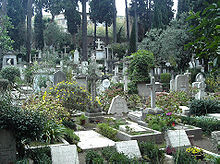This article needs additional citations for verification. (February 2015) |
| Non-Catholic Cemetery Protestant Cemetery | |
|---|---|
Cimitero acattolico | |
 | |
| Details | |
| Established | 1716 |
| Location | |
| Country | Italy |
| Coordinates | 41°52′35″N 12°28′48″E / 41.8764°N 12.4799°E |
| Type | Public |
| Style | 18th–19th-century European |
| Website | Official website |
| Find a Grave | Non-Catholic Cemetery Protestant Cemetery |

The Non-Catholic Cemetery (Italian: Cimitero Acattolico), also referred to as the Protestant Cemetery (Italian: Cimitero dei protestanti) or the English Cemetery (Italian: Cimitero degli Inglesi), is a private cemetery in the rione of Testaccio in Rome. It is near Porta San Paolo and adjacent to the Pyramid of Cestius, a small-scale Egyptian-style pyramid built between 18 and 12 BCE as a tomb and later incorporated into the section of the Aurelian Walls that borders the cemetery. It has Mediterranean cypress, pomegranate and other trees, and a grassy meadow. It is the final resting place of non-Catholics including but not exclusive to Protestants or British people. The earliest known burial is that of a Dr Arthur, a Protestant medical doctor hailing from Edinburgh, in 1716.[1] The English poets John Keats and Percy Bysshe Shelley, as well as Russian painter Karl Briullov and Italian Marxist Antonio Gramsci are buried there.